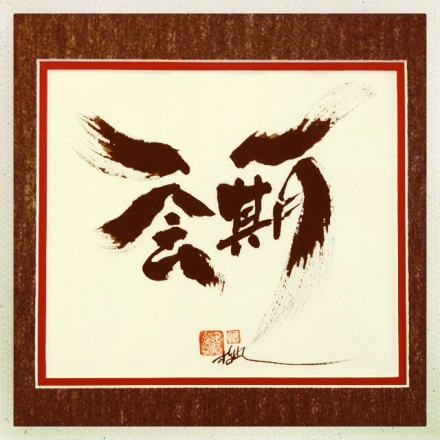
The phrase ichi-go ichi-e—literally, “one time, one meeting”—is often described by Japanese and Westerners alike as carpe diem, “seize the day.” Or, if you prefer the pop-culture version, “YOLO.”
I would argue, however, that though both the Western and Eastern phrases offer up a certain immediacy, they engage very different worldviews.
Like carpe diem, ichi-go ichi-e does point directly to the present experience. But it does so in a way that also includes another oft-mistranslated Japanese word, natsukashii. This adjective is said to mean “nostalgic” or “good old” in English, but that does not quite capture its true value in Japan, a country that embraces mastery and emulation as its highest aesthetic.
So ichi-go ichi-e is not simply “pay attention to now.” It is “pay attention to now and rest in the awareness of all that has come before, all of the causes and conditions that now culminate and come together in this present moment; notice that this moment, too, will pass.”
“Seize the day,” as it is often intended in American culture, is a call to action in the present only (with some attention to the fact that tomorrow may or may not be). “Make the best use of this day! Take the opportunity! Do what you will because life is short! Partake! Enjoy!”
Ichi-go ichi-e, in contrast, centers on the understanding that this moment absolutely will not continue or be repeated. It is lost forever to the truth of time.
In the martial arts (a context in which the phrase is used often), ichi-go ichi-e may seem particularly relevant in that “what came before” is past effort. All of that work culminates in each moment, every time a new effort is made. Thus, there is no “this is just practice.” This is your singular chance to get it right. There is no future chance. There is only now, resting on all that came before. Whether or not the present effort actually produces perfection is irrelevant. All is on the realization of the actor: “This is my one last chance.” Every time.
Tea ceremony, where the Japanese phrase originated, is pregnant with constant and unmistakable reminders of impermanence—seasonal artwork, wabi-sabi utensils, and other invitations to reflect on transience—so that the participants fully realize the theme of past-present in one meeting, one moment. That theme resonates in encounter.
Ichi-go ichi-e, then, is a call not to action but to perception. And within this, there is the potential for an ethical sensibility: the reality of impermanence, coupled with the influences of the past, can beget a deep sense of connection to all. It presents a basis of compassion for all beings.
We see how past action and inaction create this present moment. And yes, we also grasp the future implications of this karma—the whole of the next moment will rest on the foundation of this present moment, and on all that came before. We witness and wonder about this in the faces of our children. We know it in ourselves.
As parents, as partners, as friends, as citizens of the world, we feel the weight and the possibility of it—for the whole of our brief lives, now and now and now and now.
—
A version of this post originally appeared in Mothering in the Middle (http://www.motheringinthemiddle.com/now-one-last-chance/#.Vob2pZMrKX1)

This is a lovely and helpful reflection for New Year’s Day.
Thank you.
Ichi Go Ichi E, or Each Moment Only Once, is also a recurring phrase posted at tea ceremonies, where calm attention to each action in each moment is strived for. The phrase is a reminder to pay attention before you lose the opportunity.
Pingback: “the dark spaces between the stars” | Jena Schwartz